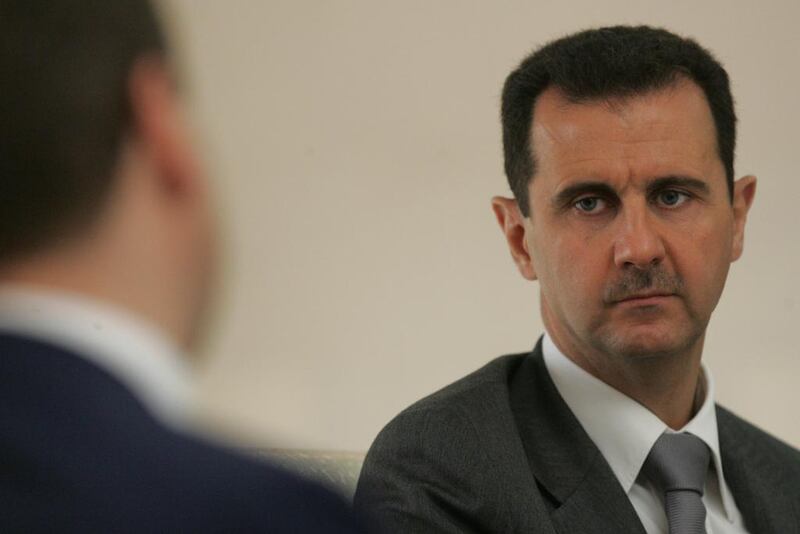With the ceasefire in Syria being violated routinely and the peace negotiations in Geneva seemingly on life support, many observers are beginning to wonder what will happen if the political options in Syria close, as seems increasingly likely.
In early March, the United States secretary of state, John Kerry, offered his vision of what might happen if the ceasefire in Syria was not respected by Bashar Al Assad’s regime. Mr Kerry told the Senate foreign relations committee: “It may be too late to keep it as a whole Syria if we wait much longer.”
Mr Al Assad has done everything to undermine agreement on a Syrian political transition as outlined by the Geneva framework. That includes telling his negotiation team not to discuss a transition, organising parliamentary elections to consolidate his position and bombarding the opposition to wreck the truce.
Assuming Mr Al Assad succeeds, then what? While no one wants to be accused of sanctioning Syria’s partition, Mr Kerry’s remarks recognised reality. Unless talks to end hostilities are successful, Syria is likely to fragment further, as rival forces consolidate their hold over their own territories.
Perhaps that’s Mr Al Assad’s aim. He has always made clear that, for him, the desirable endgame in Syria is to take back all the areas his regime lost. That may seem fanciful given the serious manpower problems his army is facing, but Mr Al Assad’s thinking may not be as outlandish as all that.
His calculation could be that as rebel factions strengthen themselves in their own territories, they will fragment further and develop into armed gangs, each protecting their area and the financial interests coming with it. With time, displeasure with such groups will grow and the regime – or at least the state – will be regarded as the lesser of two evils.
At the same time, Mr Al Assad can see that the regional environment is changing. Who can say that the Arab consensus on Syria that existed in 2011 still exists? Most of Syria’s neighbours – Iraq, Jordan and, to an extent, Lebanon – are not on the same wavelength as Turkey and the Gulf states over the Syrian conflict. These countries may not care for Mr Al Assad, but are wary of what might happen were he to fall.
Indeed, a recent report on a Syrian pro-opposition website suggested that Saudi Arabia believes Jordan was involved in the assassination of the leader of the Army of Islam, Zahran Alloush, in December. Mr Alloush was killed in a Russian air strike, and there is suspicion that information on him was passed on to the Russians by Amman.
While the report could be bogus, it would not be the first time an Arab ally of the Saudis has been accused of playing both sides in Syria. Last August there were reports that Egyptian rockets had been sent to the Syrian army, and were used in its bombardment of the rebel-held town of Zabadani.
It’s difficult to determine whether such stories are true. However, one can argue that, for domestic reasons, Amman and Cairo have an interest in preventing extremists, whether ISIL or Jabhat Al Nusra, from gaining in Syria.
That incentive will only increase as the Geneva process falters. The most telling moment reflecting the limits of the talks came when the UN envoy, Staffan de Mistura, proposed that Mr Al Assad remain president during a transitional phase, though surrounded by three deputies named by the opposition. When this was rejected, the envoy insisted the idea was not his.
In other words, a process built around a transition away from Mr Al Assad would be replaced by a mechanism to circumvent such an outcome, albeit momentarily. Yet the Syrian regime has often shown that nothing is as permanent as the momentary.
Mr Al Assad can take solace in the fact that neither Russia nor anybody else can push for his removal from office. That’s because the president’s allies don’t quite know how to do it without risking bringing the whole state edifice down. As for many of Mr Al Assad’s enemies, their focus on ISIL has made them unwilling to do anything to destabilise him.
So Mr Al Assad may have a point. As the situation in Syria putrefies further, the impetus on all sides may shift towards implicit support for a return of the Syrian state. The president makes people gag, but presented only with bad options they may come around to looking the other way on his crimes.
Certainly Mr Al Assad’s efforts to retain control over the networks of the state and not abandon even distant outposts such as Deir Ezzor and Qamishli suggest he is thinking along those lines. His survival will come, if it comes, only if he continues to be identified with the state and its apparatus.
The Syrian leader may be delusional, but until now his manoeuvres have prevented any replacement. Geneva has failed to weaken him and many countries in the region are adapting. Between chaotic fragmentation in Syria and Mr Al Assad, they may gradually come to prefer the Syrian president.
Michael Young is a writer and editor in Beirut
On Twitter: @BeirutCalling





